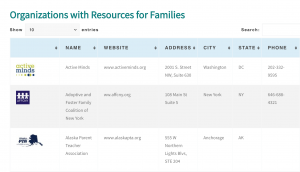The Conflict Compass Program teaches conflict resolution skills to help people navigate family conflicts related to mental health situations. It emphasizes key conflict resolution values of choice, impartiality, and empowerment. The program is a project of the CUNY Dispute Resolution Center and MH Mediate, made possible with funding from the AAA-ICDR Foundation.
Who Should Use Conflict Compass
Conflict Compass is designed with broad applicability:
- We define “family” more broadly than biological relatives, to also include any people who love each other and are active in one another’s lives.
- We define “family mental health conflict” as any conflict where the subject is mental health and/or conflicts when participant(s) have mental health histories.
- We recognize that mental health problems are very common, with close to half of us experiencing them during our lifetimes, and that all of us have mental health needs.
Empowerment, Choice, and Voice
Conflict Compass was designed to exemplify best practices in conflict resolution. We remain impartial across diverse perspectives in mental health, framing all decisions as personal choices. We encourage validating communication that helps all stakeholders to feel that their voices are heard, and to feel they are empowered as they collaborate to reach decisions.
Special Consideration for Children
The principles in Conflict Compass are applicable for both adults and children, with the key difference being that children may have less autonomy when adults have responsibilities and authority to make decisions on their behalf. Even though children may not always have the power to make their own choice, it is still important to empower them through listening to their voice, validating their perspective, and communicating about mental health decisions. In this way, all Conflict Compass lessons are applicable to conflicts with children as well as adults.
Access the Training
You can watch this overview video to tour the training, and click the tabs below to access each training module including the video lesson, accompanying tool, and evaluation.
Click here to download the Appreciate Mental Health Perspectives Worksheet
Please help us by clicking here to complete a short evaluation
Click here to download the Positions and Needs Worksheet
Please help us by clicking here to complete a short evaluation
Click here to download the Share Challenging Information Checklist
Please help us by clicking here to complete a short evaluation
Click here to download the Reality-Check Your Agreement Checklist
Please help us by clicking here to complete a short evaluation
Click here to download the Sample Questions to Discuss Communication
Please help us by clicking here to complete a short evaluation
Click here to download the Sample Questions to Discuss Sensitivities
Please help us by clicking here to complete a short evaluation
Click here to download the Sample Questions to Discuss Treatment
Please help us by clicking here to complete a short evaluation
Click here to download the Visualizing Life Choices Worksheet
Please help us by clicking here to complete a short evaluation
Click here to download the Resources Guide
Please help us by clicking here to complete a short evaluation
Q&A Calls and Conflict Compass Updates
Our Question and Answer Conference Calls (Q&A Calls) will be on:
- Tuesday August 28th, 1PM – 2PM EST [Click here for recording]
- Wednesday October 3rd, 1PM – 2PM EST [Click here for recording]
- Thursday November 29th, 1PM – 2PM EST [Click here for recording]
- Friday February 1st, 1PM – 2PM EST [Click here for recording]
You can attend them live or submit your questions in advance. Click here to submit questions for upcoming calls. To be notified about Conflict Compass Program resources, and invited to participate in the Q&A Calls, please submit your e-mail address in the form below:
Resource Directories
To access directories for organizations serving families and conflict resolution services, please click here.

More Resources from MH Mediate
MH Mediate founder Dan Berstein developed the Conflict Compass Program. His company, MH Mediate, provides additional resources for families and organizations looking to improve how they communicate about mental health. Visit www.mhmediate.com to access them.
About Dan Berstein, Trainer
Dan Berstein is a mediator living with bipolar disorder and the founder of MH Mediate. He is Vice Chair of the Diversity Committee of the American Bar Association Section of Dispute Resolution and he founded the Dispute Resolution in Mental Health Initiative with Dr. Maria Volpe at the CUNY Dispute Resolution Center. Dan holds a master’s degree in Mental Health from the Johns Hopkins School of Public Health and a bachelor’s degree from the Wharton School.
Click here to watch Dan’s TEDxTalk, “How to Talk About Mental Health Without Offending Everyone.”
Partner With Conflict Compass
If your organization would like to partner with Conflict Compass to share our resources with your staff and constituents, and be part of our online directories, please click here.


